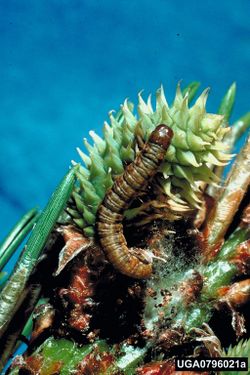Dioryctria (genus)
| Literature database |
|---|
| 62 articles sorted by: |
| • year (descending) |
| • research topics |
| • countries/regions |
| • host plants |
| • list of natural enemies |

Author(s): Larry R. Barber, USDA Forest Service
Source: Wikimedia Commons
Dioryctria Zeller, 1846 - (coneworms)
The genus contains around 80 species of small moths. The larval stages (coneworms) infest cones, buds, shoots and branches of pines and other conifers, mainly in temperate and sub-tropical regions of North America and Europe. The damage can result in more than 50% of the seeds being attacked and unable to germinate. A given species might be specialized on one conifer genus or have a wider host range.
Several species are known as borers that attack branches of pine trees. Infested branches might break and shoots die off as a result of the feeding. Typically, the females deposit their eggs into wounds and the emerging larvae bore into the wood. Younger trees are more often affected.
| Vernacular names | |
|---|---|
| • English: | coneworms |
| • Français: | pyrales des cônes |
The genus has can be recognized by various characteristic morphological features, including the colour pattern of the forewings which consists of 2 wavy transverse bands with a stigma in between. The wing venation and the structure of the male genitalia are also characteristic.
Currently, the following species have been entered into the system: